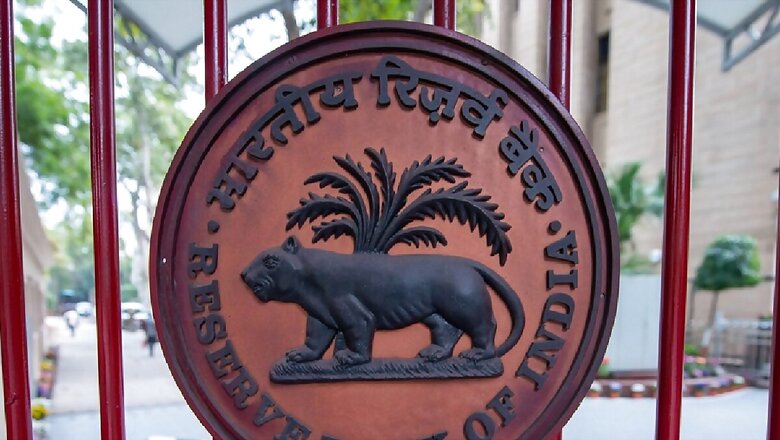
views
RBI Monetary Policy June 2024 Highlights: The RBI’s Monetary Policy Committee on Friday, June 7, decided to keep the key repo rate unchanged for the 8th consecutive time at 6.5 per cent, maintaining the stance of ‘withdrawal of accommodation’. The decision has been taken with a 4:2 majority. The RBI has revised upwards FY25 GDP projection to 7.2 per cent as against 7 per cent earlier. However, it projects CPI inflation for 2024-25 same at 4.5 per cent. Here are the top decisions of the RBI on Friday:
RBI’s Status Quo on Repo Rate, SDF, MSF
The RBI’s monetary policy committee on June 7 decided to keep the repo rate unchanged for the eighth time in a row, at 6.5 per cent. The RBI MPC also kept the SDF unchanged at 6.25 per cent, and MSF and Bank Rates maintained at 6.75 per cent. The SDF is the lower band of the interest rate corridor, while the MSF is the upper band.
FY25 GDP Growth Projection Raised To 7.2% Vs 7%
The RBI has revised upwards FY25 GDP projection to 7.2 per cent as against 7 per cent earlier. This is contrary to analysts’ expectation of a lower FY25 GDP forecast amid high base of FY24, which saw economic growth of 8.2 per cent.
“Real GDP growth for 2024-25 is projected at 7.2 per cent with Q1 at 7.3
per cent; Q2 at 7.2 per cent; Q3 at 7.3 per cent; and Q4 at 7.2 per cent,” the RBI said in the second bi-monthly monetary policy on FY25.
FY25 GDP Forecast Unchanged At 4.5%
Stating that the RBI remains vigil on any upside risk inflation, especially food inflation, Governor Shaktikanta Das kept the CPI inflation for 2024-25 same at 4.5 per cent.
“The developments relating to growth and inflation are unfolding as per our expectations. When the projected GDP growth of 7.2 per cent for 2024-25 materialises, it will be the fourth consecutive year with growth at or above 7 per cent. Headline CPI continues to be on a disinflationary trajectory. Monetary policy has played an important role in this process. This is evident from the decline in headline inflation by 2.3 percentage points between Q1: 2022-23 and Q4 of 2023-24. Supply-side developments and government measures also contributed to this moderation of headline inflation. Repeated food price shocks, however, slowed down the overall disinflation process,” he added.
Additional Measures by RBI:
Bulk Deposits Threshold for Banks Raised to Rs 3 Crore
The Reserve Bank of India (RBI) on June 7 revised the definition of a bank ‘bulk deposit’ to Rs 3 crore or more in a single deposit. Currently, a bank FD of Rs 2 crore and above is considered a bulk FD. The announcement was made by RBI Governor Shaktikanta Das on Friday. Banks often offer higher interest rates on bulk deposits compared to regular deposits.
RBI Announces UPI Lite E-Mandate
The RBI on Friday announced the introduction of the UPI LITE e-mandate to create a more seamless payment ecosystem. UPI Lite was introduced in September 2022 to enable small value payments quickly and seamlessly through an on-device wallet.
RBI Sets Up Digital Payments Intelligence Platform
The Reserve Bank of India Governor on Friday announced the creation of a dedicated platform to tackle the growing challenges of digital payment fraud in India. RBI has taken several measures over the years to deepen digital payments while ensuring their safety and security. These measures have boosted consumer confidence.
Rationalisation of Guidelines for Exports, Imports under FEMA
In view of the changing dynamics of international trade and in line with the progressive liberalisation of foreign exchange regulations, the RBI proposes to rationalise the extant FEMA guidelines on export and import of goods and services. This will further promote ease of doing business and provide greater operational flexibility to authorised dealer banks. Draft guidelines will be issued shortly for stakeholder feedback.
Inclusion of Recurring Payments with Auto-Replenishment Facility under the E-Mandate Framework
The adoption of e-mandates for recurring payment transactions has been
increasing. It is now proposed to include payments, such as replenishment of balances in Fastag, National Common Mobility Card (NCMC), etc. which are recurring in nature but without any fixed periodicity, in the e-mandate framework. This will enable customers to automatically replenish the balances in Fastag, NCMC, etc. if the balance goes below the threshold limit set by them. This will enhance convenience in making travel/mobility-related payments.














Comments
0 comment